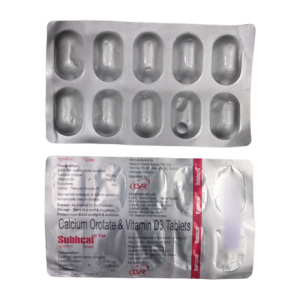VITAMIN D3 (CHOLECALCIFEROL) + CALCIUM OROTATE
Vitamin D3 (cholecalciferol): Vitamin D3, also known as cholecalciferol, is a type of vitamin D that is naturally produced in the skin when exposed to sunlight. It can also be obtained through dietary sources or as a supplement.
Vitamin D3 is primarily used to treat and prevent vitamin D deficiency. It is essential for maintaining healthy bones and teeth, as it helps the body absorb calcium and phosphorus from the intestine. Adequate levels of vitamin D3 also play a role in proper immune system function and overall health.
The mechanism of action of vitamin D3 involves the activation of the vitamin D receptor in target tissues. Once absorbed into the bloodstream, vitamin D3 is converted into its active form, calcitriol, in the liver and kidneys. Calcitriol then binds to specific receptors in the intestines, bones, and other organs, which triggers various biological processes involved in calcium and phosphate regulation.
The recommended dose of vitamin D3 may vary depending on the specific needs of the individual. The average daily recommended dose for adults is 600-800 international units (IU), although higher doses may be prescribed for individuals with severe deficiency or certain medical conditions.
As a general rule, it’s important to follow the recommended dosage guidelines provided by a healthcare professional or the instructions on the supplement packaging. Too much vitamin D3 can lead to toxic levels of calcium in the blood, which can cause symptoms such as nausea, vomiting, increased thirst, frequent urination, weakness, and kidney damage.
Common side effects of vitamin D3 supplementation are rare but may include mild gastrointestinal symptoms, such as constipation, diarrhea, or stomach cramps. It is always recommended to consult a healthcare professional before starting any new supplement, especially if you have any pre-existing medical conditions or are taking other medications that may interact with vitamin D3.
Calcium Orotate: Calcium Orotate is a medication that contains the mineral calcium in the form of calcium orotate. It is commonly used as a dietary supplement to treat calcium deficiency, promote strong bones, and support cardiovascular health.
The mechanism of action of Calcium Orotate involves the absorption and utilization of calcium by the body. Calcium is an essential mineral that is necessary for various bodily functions such as muscle contraction, nerve transmission, and blood clotting. Calcium orotate is believed to be more easily absorbed by the body compared to other forms of calcium.
The recommended dose of Calcium Orotate may vary depending on the individual’s age, medical condition, and the severity of calcium deficiency. It is usually taken orally in the form of tablets or capsules. It is important to follow the instructions provided by your healthcare provider or the product label. It is advisable to take the medication with food to enhance its absorption.
Although Calcium Orotate is generally well-tolerated, it may cause some side effects in certain individuals. The most common side effects include gastrointestinal disturbances such as constipation, diarrhea, and stomach discomfort. In rare cases, it may cause allergic reactions such as rash, itching, or swelling. If you experience any severe or persistent side effects, it is important to seek medical attention promptly.
It is important to note that Calcium Orotate may interact with certain medications or supplements. Therefore, it is essential to inform your healthcare provider about all the medications and supplements you are currently taking to avoid any potential interactions.
Overall, Calcium Orotate is a dietary supplement that provides calcium to the body. It is primarily used to treat calcium deficiency and support bone health. However, it is advisable to consult with a healthcare professional before initiating any new supplement regimen.

